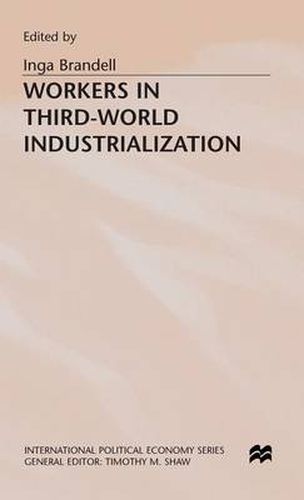Readings Newsletter
Become a Readings Member to make your shopping experience even easier.
Sign in or sign up for free!
You’re not far away from qualifying for FREE standard shipping within Australia
You’ve qualified for FREE standard shipping within Australia
The cart is loading…






This title is printed to order. This book may have been self-published. If so, we cannot guarantee the quality of the content. In the main most books will have gone through the editing process however some may not. We therefore suggest that you be aware of this before ordering this book. If in doubt check either the author or publisher’s details as we are unable to accept any returns unless they are faulty. Please contact us if you have any questions.
In third world countries an increasing number of people have been drawn into the process of industrialization as wage workers. Only when confronted with their practices, strategies and struggles can the competing and contradictory policies they face at the level of capital and state be explained. Consequently, the empirical analyses here presented cover the limits set by workers to exploitation in workshop production, ethnicity as a workers’ strategy, the role of workers’ absenteeism and turnover, and labour strategies in a situation of recession and de-industrialisation. Using a historical approach labour migration, union strategy for democratisation, and the world-scale pattern of labour unrest are studied as outcomes of social conflict. Some of the chapters in this book focus on single events in a factory, others on a branch or a region in a long-time perspective. They all contribute to an empirical and theoretical investigation of the impact of industrial workers’ actions on societies in transition. They also share the same urge to look beneath the surface in order to find the unnamed, and to understand how they make history.
$9.00 standard shipping within Australia
FREE standard shipping within Australia for orders over $100.00
Express & International shipping calculated at checkout
This title is printed to order. This book may have been self-published. If so, we cannot guarantee the quality of the content. In the main most books will have gone through the editing process however some may not. We therefore suggest that you be aware of this before ordering this book. If in doubt check either the author or publisher’s details as we are unable to accept any returns unless they are faulty. Please contact us if you have any questions.
In third world countries an increasing number of people have been drawn into the process of industrialization as wage workers. Only when confronted with their practices, strategies and struggles can the competing and contradictory policies they face at the level of capital and state be explained. Consequently, the empirical analyses here presented cover the limits set by workers to exploitation in workshop production, ethnicity as a workers’ strategy, the role of workers’ absenteeism and turnover, and labour strategies in a situation of recession and de-industrialisation. Using a historical approach labour migration, union strategy for democratisation, and the world-scale pattern of labour unrest are studied as outcomes of social conflict. Some of the chapters in this book focus on single events in a factory, others on a branch or a region in a long-time perspective. They all contribute to an empirical and theoretical investigation of the impact of industrial workers’ actions on societies in transition. They also share the same urge to look beneath the surface in order to find the unnamed, and to understand how they make history.